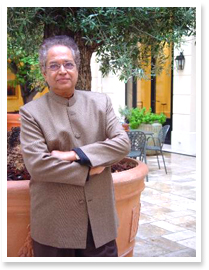Sudhir Kakar, Ph.D., presented his talk “Religious Violence: Hindus and Muslims in India” at the Derner Institute in October 2015.
 by Jett Stone
by Jett Stone
Sudhir Kakar, Ph.D., presented his talk “Religious Violence: Hindus and Muslims in India” to clinical psychology Ph.D. candidates and professors from Adelphi’s Gordon F. Derner Institute of Advanced Psychological Studies. A panel discussion capped off the afternoon. Student panel members included: Max Cinberg, Kahlen Kim, Lauren Knopf, Nili Solomonov and Remi Sowemimo-Coker
Dr. Kakar’s long academic journey has spanned the fields of mechanical engineering, economics and psychoanalysis, and includes professorships at universities worldwide and a renowned psychoanalytic practice in India (not to mention 24 books). On October 21, 2015, he made a stop at Adelphi University.
The psychoanalyst and writer began his talk by recounting the cycles of peace and violence among the world’s major religious groups, and then introduced his psychological conceptualization of the ongoing conflict between India’s Hindus and Muslims. Using his 19 case study interviews of interactions between Hindus and Muslims as a foundation, Dr. Kakar explained religious violence as a clash between group identities, and less a division between religious beliefs or practices. He posited that faith (in contrast to other collective identities) more potently fuels violent passions. Religion, he stated, can be used an expedient moral justification for fanatics; consequently, radicals feel less guilt or shame for their murderous actions.
Dr. Kakar also presented his theory on the psychological development of religious identity, and he contrasted how at an early age children form light and dark versions of individualism, “I Am,” and community, “We Are.” Within “We Are,” he labeled two tracks: one of intimacy and connection (light), and another of confrontation and intolerance (dark). He noted how this darker version of “We Are” sews the seeds of aggression. The child’s representational inner world assimilates both light and dark but can project the darkest elements onto other groups. Inner conflict and “animalistic” impulses bring about stereotyping and can beget a spiral of perceived threats and counter-postures often ending in violence.
Dr. Kakar also described rumormongering among Hindus and Muslims as stirring up paranoia and group demonization. He additionally stressed how faith-based atrocities throughout history have been carried out by those defending an idealized community from attack, and he cited the danger in this idealism as an “ends justifying the means” and a “moral mandate.” Dr. Kakar stressed that educational efforts in India and elsewhere ought to emphasize fairness as much as justice, and he optimistically concluded by reminding his audience that compassion is as natural as violence.
Student panel members expanded on Dr. Kakar’s talk and initiated discussion with the audience about multiculturalism in psychotherapy and the therapist’s job of managing patients and their group identities.
Jett Stone is a clinical psychology doctoral candidate at the Derner Institute and a writer.
For further information, please contact:
Todd Wilson
Strategic Communications Director
p – 516.237.8634
e – twilson@adelphi.edu